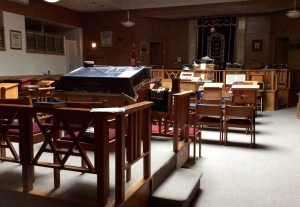When you grow up, you look at the world around you and for some strange reason assign a permanence to it. Your mother will always be there for you. The custard stand two blocks away will always be there to satisfy your sugar cravings and the mini-golf course next to the custard stand will always be there for your birthday parties. It’s a delusion that gives comfort. All of the places and all the adults you know – some you love – as a child will in fact eventually disappear. Well, not all. The custard stand of my childhood is miraculously still there.
This month a famous rabbi I knew a bit died, Abraham Twerski. I’d see him occasionally as a child, most commonly on the Jewish holiday Simchas Torah. Like me, he came from Milwaukee. Like me, he left Milwaukee to pursue his intellectual passions. His father, Rabbi Jacob, was my childhood rabbi and gave me my bar mitzvah lessons.
Here’s a video of Abraham’s father with my grandfather and some others I remember from my past, all gone.
Here’s an audio of Rabbi Jacob Twerski singing my bar mitzvah Haftorah portion.
Rabbi Jacob spoke a Ukrainian Yiddish and read Hebrew with a Ukrainian Jewish accent. He came to the US a decade before World War II began. His oldest son, Abraham, was born the following year. His synagogue, built in the 1950s, was filled almost entirely with Holocaust survivors, including my parents. Like my childhood custard stand, the synagogue, too, is miraculously still around, Here’s a recent picture of it, refurbished with funds from a Holocaust survivor and a landsman of my father. 
As a kid, I was tapped to be an occasional cantor and would sing in this synagogue. It’s tiny, but back in the day I thought it was as big as Madison Square Garden. I was certain I’d be a cantor or, after I heard Richard Tucker sing at a local wedding, an opera singer as an adult. My eventual atheism got in the way of being a cantor and my post-puberty inability to hit a high C got in the way of making it to the Met. But I could still hit a high C (and higher) the year of my bar mitzvah.
The hour before I would have my bar mitzvah lessons was when Jacob Twerski had his daily hour of counseling. He was renowned for this. Judges and lawyers would tell people, including some gentiles, “Go see Twerski. If he can’t help, then come back to me.” But mostly the people who came were Polish and Ukrainian Jews and they would always have their counseling in Yiddish.
I would come to my lessons fifteen minutes ahead of time. The French doors leading to the rabbi’s office were always open. I’d sit outside and listen. I heard of bad marriages, bad children, and bad business partners. Then I’d listen to the rabbi’s advice. It was all eye opening.
One time my grandfather’s old business partner was there. They’d split up amicably years before. I heard all the troubles he had with his wife. When he got up to leave, he saw me and turned red. “Teyvoo’s grandson heard everything!” he shouted out.
“Him? No worries. He doesn’t know a word of Yiddish,” the rabbi said.
“Teyvoo’s grandson doesn’t know Yiddish? Impossible!” he shouted out in Yiddish.
“Tell Mr. X, Shtuleh. Do you know Yiddish?”
“Not a word. I never learned it.”
“See! You have nothing to worry about.”
Then I understood. The rabbi wanted me to listen to all of these stories. This was my real education. The actual bar mitzvah lesson was just paperwork.

Recent Comments